AP Psychology Resources for Unit 3 Sensation & Perception
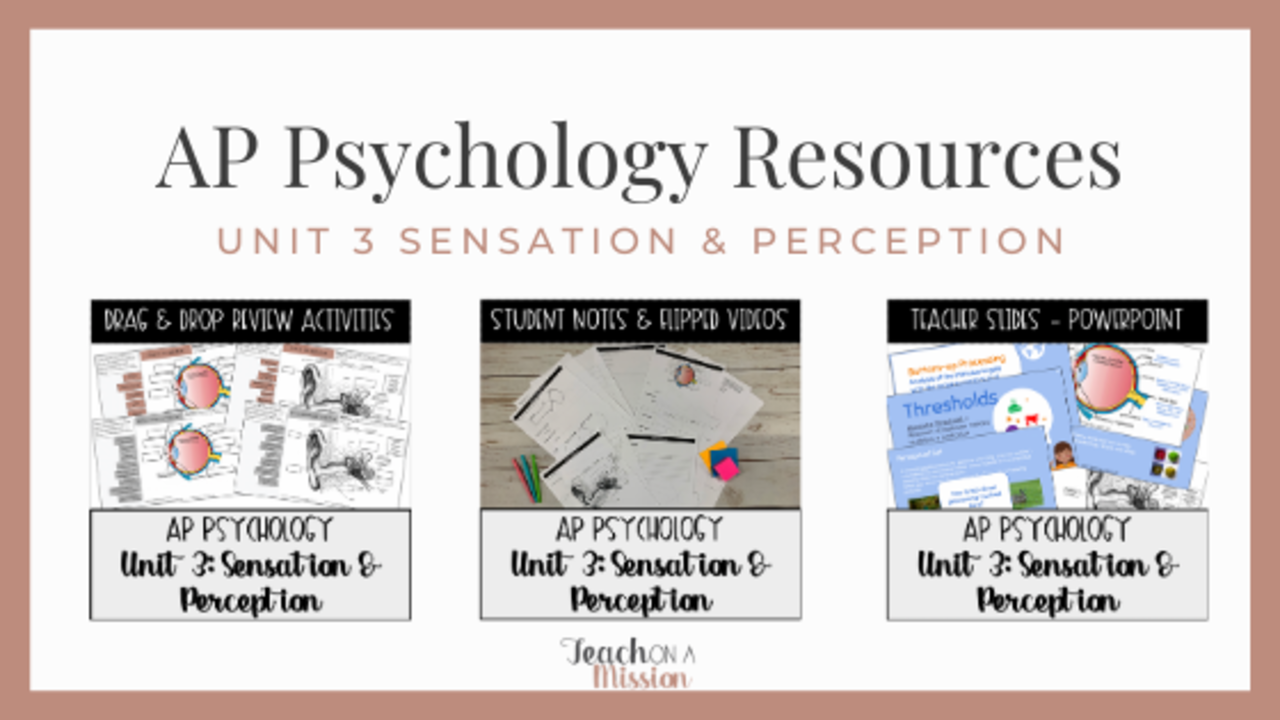
By this time of year, no matter what you teach, you are rolling right along in content yet only holding on for dear life through the awfulness that is October, November, and December when it comes to having motivation and patience. Remember, you can do this!!
Seriously, this time of year is hard. It's hard because there is not really a chance to come for air in the near future. You just have to keep your head down and keep at it. That's why I hope to provide you with resources that are quality, reliable, and engaging for your students in AP Psychology.
Unit 3: Sensation & Perception
Sensation and Perception is also a large unit, meaning lots and lots of vocabulary and new concepts, but it's not necessarily worth it's weight in vocab terms.
Here's what I mean... Sensation & Perception is dense, but it's not big. It's percentage of how many questions on the test will be dedicated to this unit is not as high as biological bases or cognitive psychology, for instance. The lesso...
AP Psychology Resources for Unit 2 Biological Bases

Once you've set up your course and laid the solid foundation that is Unit 1 Scientific Foundations, it's time to take a bit of a turn into a more anatomy-focused unit. One that I've always called "sciency" because of the focus on, well, science.
It's easy to get trapped in the tunnel of "What do I cover? What don't I cover?"... more like a black hole you could spend three weeks in.
My biggest advice is to be sure you are focused on the standards as laid out by College Board's CED, and don't stray too far from that because then, you're just wasting time.
As with the first unit, I want to provide you AP psychology activities and resources in hopes that you get to focus your time elsewhere in being effective with your students - you are the number one influence on their learning after all. So let's get to it.

Unit 2: Biological Bases
Whereas Unit 1 was focused on history and the mathematical basis of psychological research, Unit 2 is focused on the biological science of psychol...
AP Psychology Resources for Unit 1 Scientific Foundations
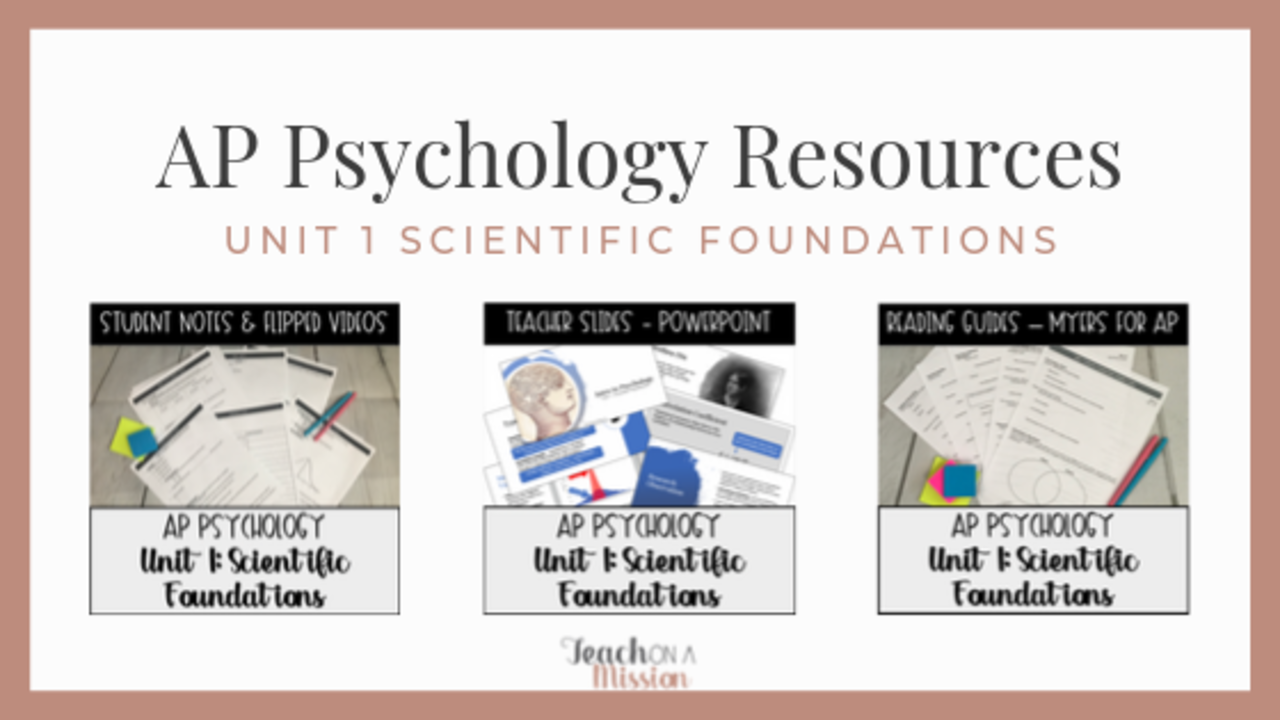
Psychology is such a unique subject that makes for an incredibly unique course for students today. So unique that no certification in any of the "core" subjects (you know, math, english, social studies, and, yes, even integrated science) prepares teachers to teach.
But that's not necessarily bad, it just means we need a little more assistance and support when we go to teach this course. Not that we don't need that support in other, less unique courses (I'm thinking like an American History, which I taught for a couple years), but for unique courses like psychology (and human geography, for instance), the extra support makes a world of difference as we try to learn the content as we teach it.
As I wrote about in a previous post, my hope is to give you that support through quality, effective resources, and possibly even coaching.
But let's take it one unit at a time. And, let's start with the first unit... Scientific Foundations. I will provide you AP psychology activities and res...
AP® Psychology Resources - A One Stop Shop
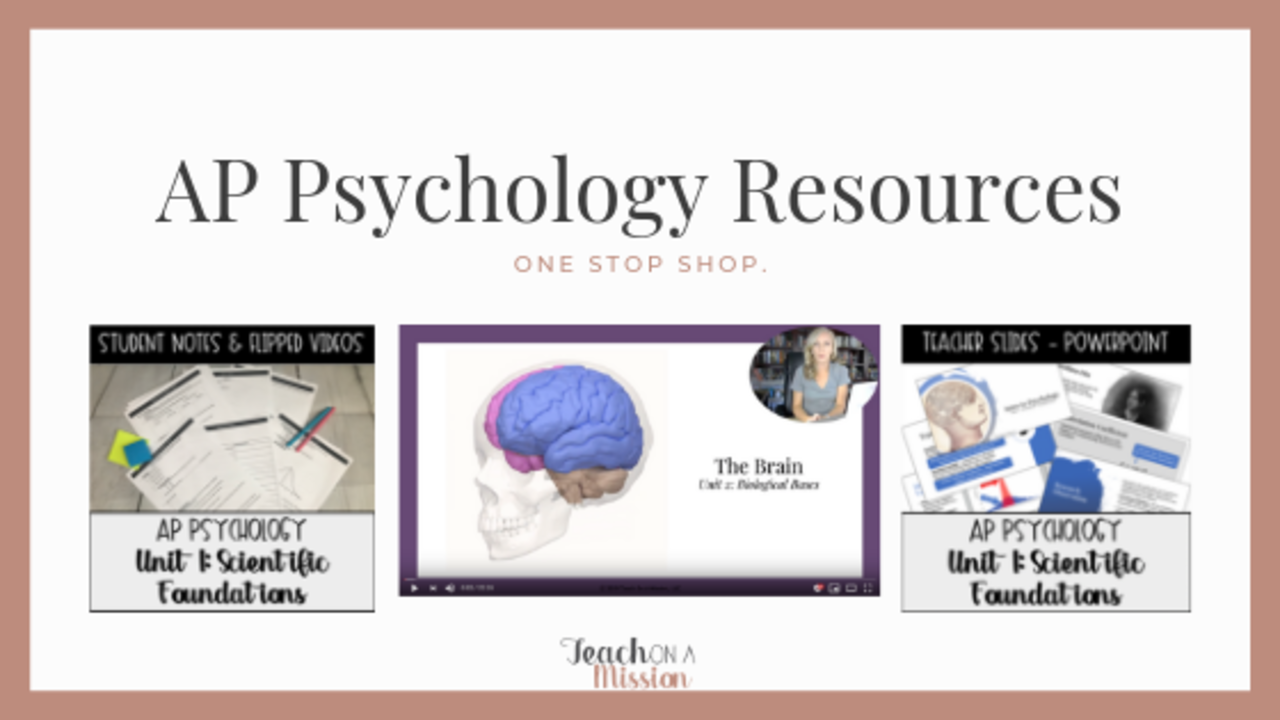
My goal in writing this post is to provide to you as many resources as I can that are a combination of paid and FREE AP® Psychology teaching resources.
A little introduction first...
I've been teaching AP® Psychology for almost ten years now since I started teaching in 2010. It is SUCH an awesome course that I think ALL students can benefit from, but it's unique because we aren't in the course just to have fun. Students are there to do well on the test that many of them will pay for, but otherwise still want to do well on to earn that college credit in May.
So, we've got to deliver for them on every unit.
Let me take you through each of the AP® Psychology resources below, each of which you can click and check out for yourself. If you feel so inclined to share these on social media, it would possibly help reach another teacher who is looking for support whether that be in just knowing the content, or having ready made resources.
YouTube
A while back I flipped my AP® Psycholo...
AP Psychology Content Coaching Video Training Part Two Sneak Peek

Video 2 of the 3 part content coaching series comes out TOMORROW!!!
I want to give you a sneak peek here. Check it out...


And here's a little behind the scenes action of my set up so I could demonstrate some key understandings...

Gotta love my HUE camera :)
How I can Support YOU.
I'm just so darn excited that many new and veteran teachers are joining our group. I am hearing from many of you of how you feel supported in this membership, and that is EXACTLY what my hope and goal is - for you to feel supported and not like you need to do ALL of the heavy lifting in preparing for the course, alone.
I have got you!
Seriously.
I don't want you to have to burn the midnight oil staying up late every night after you've put your own kids to bed, or work all evening as soon as you get home. Leave work at work without the guilt and stress of feeling like you aren't prepared and are some how letting down your students.
NOPE! I'm done with that, and I want you to be done with it t...
AP Psychology Content Coaching Video Training Part One Sneak Peek

I've got the first of THREE content coaching videos ready to go for you and it will be sending out, arriving to your email inboxes THIS Wednesday (July 24, 2019)!
I have to say that this may be one of my favorite videos I've made, and as a flipped classroom teacher, I've made a lot of videos.
Something I haven't done more than once or twice before is switch between my web camera and my document camera. So, by doing just that in this video I was able to speak about the content over my slides (more helpful for those of you taking some notes) AND demonstrate my thinking and teaching on paper! I loved it, and I know you will too.
Here's a few screenshots of the video to give you a sneak peek of what's coming...




If you didn't catch my Facebook Live about this training, I highly recommend you do so, because I give a sneak peek there as well.
Here's the gist...
I'm going to help you feel confident about teaching the normal curve to your students this year. I'm going to giv...
AP Psychology Content Coaching Video Training Series
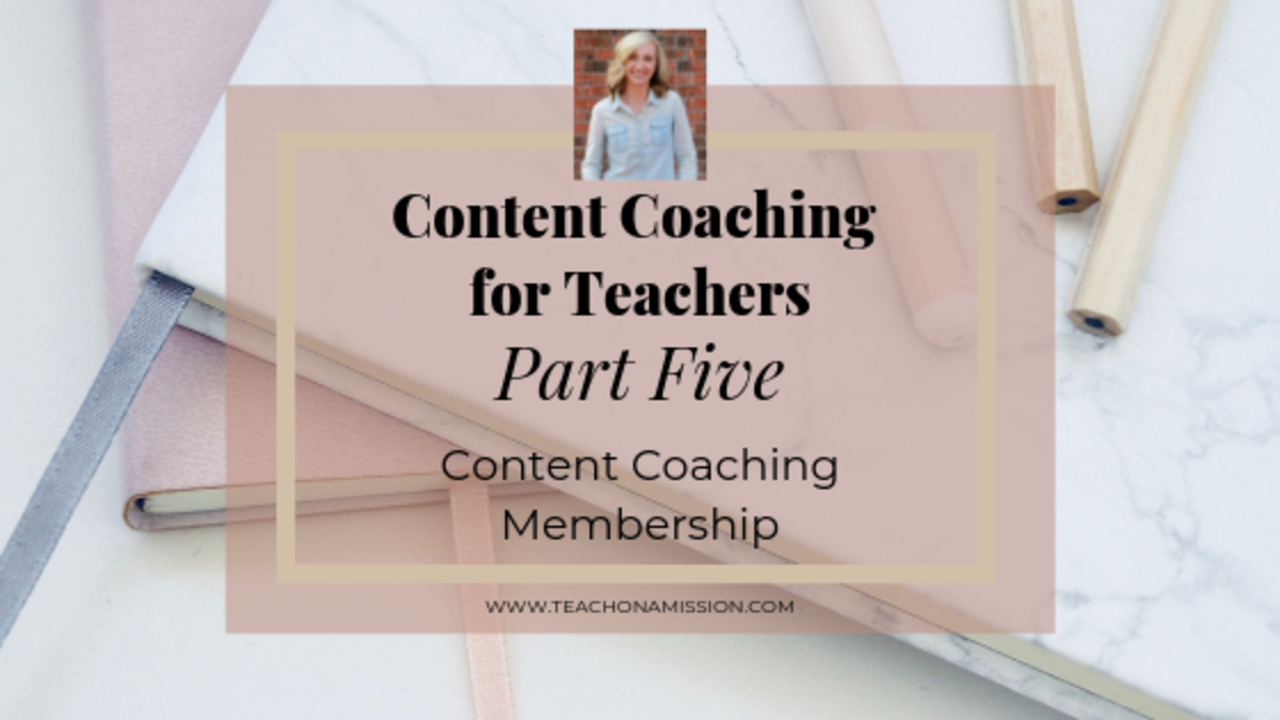
Welcome to Part 5 of our Content Coaching Series. Be sure to go back and check out each part of the series to learn more about this new(ish) way to support teachers, and new ways that I would like teachers to be supported through content coaching (part one, two, three, four).
The one-on-one coaching model in education is great because a solid relationship is able to form, and more personalized coaching can take place, and impact is made on the classroom and students. Think of an instructional coach (or any kind of coach) you've worked with. I'm hoping it was a positive working-relationship, and I'm sure you gained great value from it because there was one-on-one work.
The catch is that one-on-one coaching, as in all industries, not just in education, is a large time and financial investment. Even still, it's the ideal solution in many cases, however, not all. Not all situations need a huge time or financial investment, especially when time and finances are the two resources that...
Content Coaching: My Biggest Advice for AP Psychology Teachers

Scratch that! This advice is for all teachers. Although I give this advice from the perspective of AP Psych, it totally applies to all courses who summation is wrapped up into one big test. Here it is...
Align your course.
Some of you are totally giving me an eye roll right now, as if to say, really - I'm ready a blog post for that advice?!?!?
You're dag-on right you are. And here's why...
There is SO MUCH out there to align your course to. Every textbook company says they've got the latest and greatest resources, which many of them do. Their handouts and activities can be great resources, but you don't necessarily want to be using their resources in the area where alignment matters the most. That area, my friends, is tests.
When it comes to aligning the assessments of your course, if the resources are available to you, you need to use the ones that are provided by the company who makes the summative assessment of your course.
In AP Psychology's case, your tests should be ...
Content Coaching in AP Psychology: Teacher Testimonials

I feel like I've been talking a big game about content coaching lately, so I want to back up all that talk with real evidence; real stories from real teachers. First, I want to remind you that I am a teacher. I am not an instructional coach, or even a content coach – at least not in the way that a school district has named me as such. I do have a master’s degree that would qualify me for those titles, but my experience in the classroom has been what’s drawn teachers to me for support and guidance, not a title.
As I’ve been teaching and flipping AP Psychology for almost ten years, many fellow AP Psych teachers have reached out and sought advice or sent their appreciation for the videos and various resources I’ve built specific to the course.
This past school year, I was able to branch out a bit from my normal in-the-classroom teaching gig and work one-on-one with a few teachers who were newer to the subject of AP Psychology. To be completely honest, I thought these people were nut...
Content Coaching: How to Empower Teachers as the Number ONE Influence on Student Learning

Last week I went on a little tangent, but hope that I spoke some value and confidence into the lives of teachers around their impact on student learning. Often times teachers are undervalued in our society and totally undercut in their funding and autonomy.
I'm here to say that needs to change, and there are ways to make that change in the education system as it exists.
My mission here at Teach On A Mission is to empower teachers to confidently step into that role as the number one influence on student learning. And there are very specific ways that I believe we can do that, and that I can help with. I will elaborate on the few ways I think that can be done given the pressures of the education field today, but for this post I want to focus on just one. That one is content coaching.
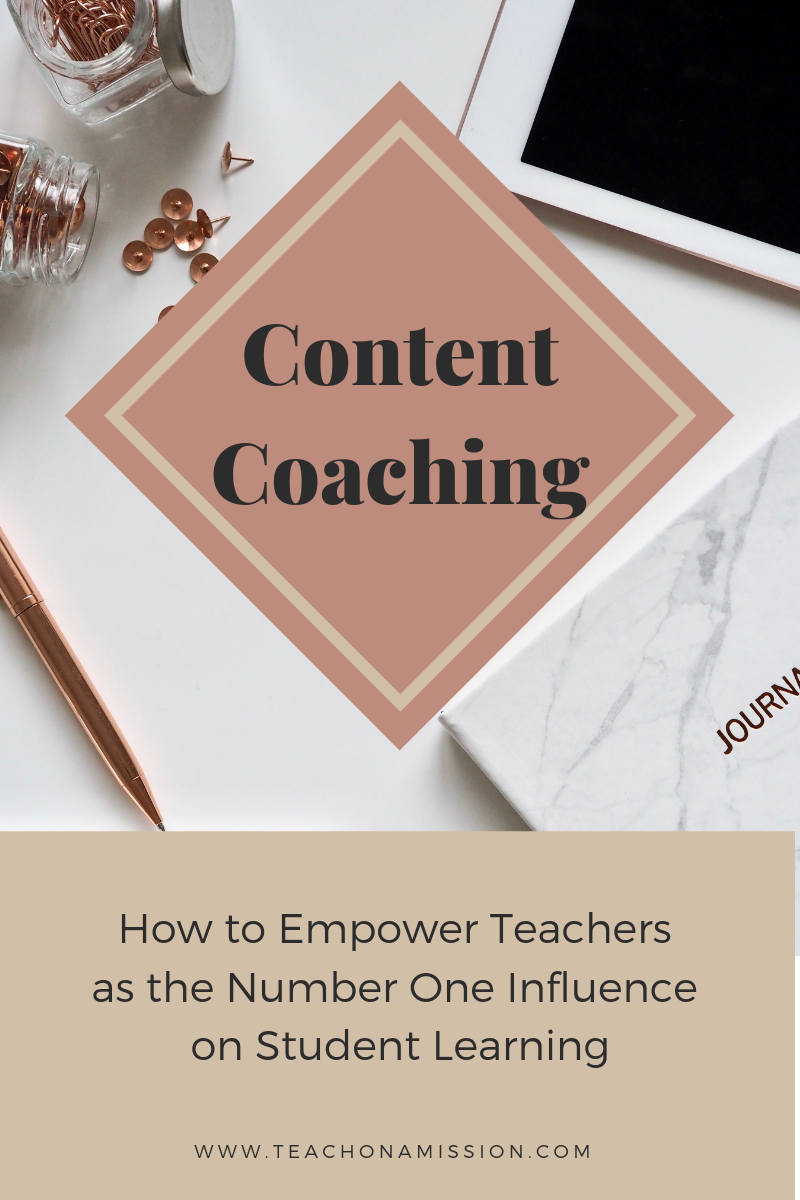
What is Content Coaching?
There are quite a few definitions of content coaching. If you google the term, you'll get a few results that point you generally in the same direction. It falls under in...




